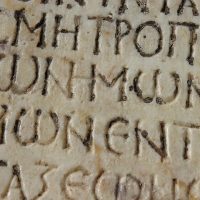I grew up learning about and knowing about Jesus through my Catholic Sunday school classes and books I would read. I accepted all of the attributes I saw in pictures of Jesus. In those pictures, Jesus was portrayed with blue eyes, light skin, and brown flowing hair. In the dawn of the technology age, that image has been challenged with the study of the time period and area in which Jesus was born and lived. The existence of Jesus is accepted by people of many walks of life, beliefs, and backgrounds. The source of disagreements lies in the details of and about Jesus.
One argument of detail that has had scholars searching is that of the language spoken by Jesus. This detail, in fact, had Israel’s prime minister, Benjamin Netanyahu, and Pope Francis actually arguing in a public meeting. Netanyahu claimed that Jesus lived in Israel so he would have spoken Hebrew. The Pope said Jesus spoke Aramaic. Netanyahu came back with his belief that Jesus may have spoken Aramaic, but he knew Hebrew. If men of such high standing and intelligence argue over this fact, then what is the answer and how can it be found?
Most religious scholars and historians believe that Jesus spoke Aramaic. While Hebrew was the main language of Israel, the language of other countries around Israel developed as Israel battled with those countries. One of those languages was Aramaic. Jesus spent most of his life in the city of his birth, Nazareth, and Capernaum. The commonly spoken language in those cities was that of Aramaic. Jesus was also recorded in many places in the gospels using Aramaic words and phrases.
During this time, while Aramaic was the commonly used language in the areas where Jesus lived, Hebrew and Greek were also widely understood and used. The difference in the usages of these languages was generally the status of the person speaking.
Hebrew was the language written and spoken in the synagogues. The high-level religious leaders such as the Pharisees and Sadducees spoke Hebrew to teach the law. Greek was used by the political leaders because the Romans ruled Israel at the time of Jesus’s life. Hebrew was also used by anyone else in political life or anyone who needed to do business with the Romans.
Because Jesus lived in a time and area in which three languages were commonly used, it is most likely that Jesus used all three languages depending on the people he was speaking to at the time. The general disagreement lies between Hebrew and Aramaic. It is likely that Jesus knew Greek but because of the nature of Jesus’s life and teachings, it is more likely he spoke Aramaic and Hebrew. The sign that was placed over Jesus’s cross was actually written in all three languages which serve to show the importance of all three languages at the time.
We know from scripture that Jesus spoke mostly to common people in casual conversations. This leads me to believe that Jesus would have wanted to speak the language of the common people which was Aramaic.
Scripture also shows times that Jesus spoke in the synagogue and to the Pharisees and Sadducees so he would have had to also understand and speak Hebrew. Perhaps the arguments of such people as the prime minister and Pope are ones who want to claim the personhood of Jesus as their own nationality. Also, the beliefs of some, who would like to argue if Jesus was more of a common person or a scholarly person.
Despite the arguments in the scholarly arena about what language Jesus spoke, many believers, such as myself, are not too bothered by what language he spoke but are more interested in what he spoke about and his teachings. The Bible has been translated into over 700 different languages. It also remains the best-selling book of all time with over 5 billion copies being sold to date. While many continue to argue over the language, most of the world is more interested in the teachings of Jesus and will continue to study his words for generations to come.





